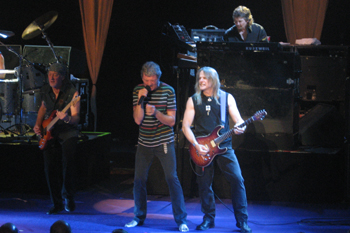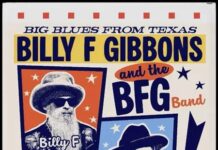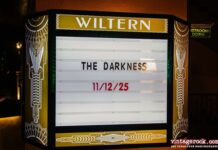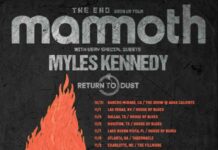By Shawn Perry
In the last few years, I’ve had some incredible close encounters with Deep Purple. There was the Blockbuster Pavilion show in San Bernardino, a simmering 100 degrees, with the Scorpions and Dio. I paid $11 a piece for 22 ounce plastic cups of Corona in the VIP area before bowing down to Steve Morse because of his God-like mastery of the guitar. He just laughed and told me to get up from the hot asphalt. My knees on the verge of bursting into flames, how could I say no…
There was the concert in 2004 at the Wiltern Theater in Los Angeles with Thin Lizzy (or what’s left of Thin Lizzy) as the supporter. That night I attempted to take pictures from the photo pit using a cheap digital camera, and got nothing but a series of colorful blurs (Is that Ian Gillan with a halo around his head? Maybe he really is Jesus Christ Superstar). Damn! But at least, they played Machine Head from top to bottom. After the show, I spoke with each member to get his take on the performance of what is arguably Deep Purple’s greatest and most popular record.
Ian Gillan: “We do most of the songs already, but it’s an interesting concept.”
Roger Glover: “I loved playing Machine Head.”
Ian Paice: “Tonight was really good. The trouble with trying to play everything from a record is that, over the past 30 years, there were certain tracks we didn’t play because we never really thought they made it as stage songs. Only one or two. But then you have to bring them in and make them work. And that’s a challenge.”
Don Airey: “You tell me. I’m on the inside, so I can’t really tell…”
Steve Morse: “I enjoyed it very much. I’m a fan and that is one of my favorite Deep Purple albums, so it was natural for me.”
My most recent run-in with the Deep Purple people eaters took place at the Pacific Amphitheatre in Costa Mesa, California. On this particular balmy night, the Purps were headlining a big fat bill that included Edgar Winter and Blue Öyster Cult. The legendary Uncle Joe Benson was prowling around backstage, shaking hands with everyone like a shady politician (he’d get my vote). And the price of beer is still outrageously scurrilous (and yet I happily pay and drink it). But here I was – ready to soak up the energy from one of the greatest hard rock bands in history, and completely unaware of yet another unscheduled meeting with the five-headed monster. But more on that later.
The previous night I saw Paul Rodgers and half of the Doors at the same venue. Now, as I galloped down the aisle with an earful of residual volume, Edgar Winter and his band were running through a string of hits and lapping up the love. When “Frankenstein” came along, I eyed one enthusiastic cat in the third row, pumping his fist in the air so hard I thought he was going to punch a hole through the ozone layer. Some things never change.
Blue Öyster Cult came out next, and they sounded much better than I expected. Actually, I didn’t know what to expect because I hadn’t seen them in almost 30 years (1978 with UFO at the L.A. Forum, to be exact). Maybe hobnobbing with Eric Bloom and Buck Dharma before the show raised my faith in what they could do. A definite highlight for me was “Cities On Flame,” a classic arena chestnut that predates “Godzilla” and other commercial minutia. The jam that ensued chased away any preconceived notions I may have had about BÖC.

Just to show how gainfully cool they still are, Bloom introduced newest member, Rudy Sarzo, the super bassist who has backed everyone from Quiet Riot to Ozzy Osbourne to Whitesnake. Sarzo slithered through a few well-meaning notes of “Crazy Train” before fading into the background for the signature closer, “(Don’t Fear) The Reaper.”
Nightfall came and Purple hit the stage with ‘Pictures Of Home,” a pastoral graze from Machine Head about a lost traveler trying to get home. Palatial performances of “Into The Fire” and ‘Strange Kind Of Woman” set the tone as Morse and Airey, the eternal “new” guys, contrived and maneuvered their instruments through the din with the greatest of ease.
I chose to ignore the boneheads scratching their heads and yawning aloud: “Is that Jon Lord up there?” or “What happened to Ritchie?” Lord gracefully retired to the orchestra podium and Blackmore is prancing around in tights, strumming a lute. Believe me when I say that Deep Purple is doing just fine without these guys. Airey and Morse are not cloned replacements: they both have introduced new dimensions, new ideas and a fresh perspective to the Purple experience. This is a rare phenomenon that happens with few well-known bands bringing in new members. Styx, Yes and Fleetwood Mac are all bands that saw their fortunes grow with new members. For Purple, it’s not only helped the music; it’s become a matter of survival. Without Morse and Airey, Deep Purple wouldn’t exist today.
Case in point is “Rapture Of The Deep,” the title track from the band’s last studio album. Morse and Airey lock in like lost brothers, effectively purplizing the song’s main riff to the point of seamless integration in a pile of Deep Purple staples. Really, this number could have easily fallen into the grooves of Fireball or Burn. A guitarist like Morse is able to simultaneously maintain his own identity within the context of a well-known Purple riff. Not an easy task when one considers that someone like Yngwie Malmsteen, given the opportunity, would have undoubtedly folded to the pressure of emulating Blackmore over transcending him. Once Morse has his chance to solo, there is no question that he isn’t Ritchie Blackmore.
Be it the Middle Eastern accents that precedes “Woman From Tokyo” or the Bach-like arpeggios that shape and shift the undercurrent of “Perfect Strangers,” Deep Purple still plays like world-class pros at the top of their craft. Paice is the most underrated drummer of his era. Glover holds down the fort without stepping on anyone else’s toes. And Gillan, toes exposed as he prances about barefooted, is no longer the screaming banshee that gave Made In Japan its zesty kick, but still croons in tune and keeps the show moving along.
“Smoke On The Water,” the closing number, was given extra juice by the presence of Edgar Winter and his guitarist Doug Rappoport. The two got plenty of spotlight soloing time between passages of the audience chanting the famous chorus. After encoring with “Hush,” I was ready to head for the door, but Junkman had other plans. So I followed him backstage just to see how long it would take for security to throw us out.
Post Show Encounter: Smoke This!

I’ve been invited into Ian Gillan’s dressing room twice after a show. Both times, he’s offered me a Heineken and a Dunhill cigarette. I love beer, but don’t smoke on a regular basis. Still the singer is so obscenely hospitable, it would have been an insult if I hadn’t indulged in his generosity. Years earlier, bassist Roger Glover bummed a Marlboro from me at the China Club in New York, so maybe this was payback time.
Tonight, Gillan’s kindness went the extra mile. The last time we had talked, he explained that he was in the process of writing a book. So I innocently asked him, with Purple constantly on the road, if he had managed to finish the book. “Well, I’m working on a novel right now,” he said.
But what about the travelogue, documenting his various experiences as a rock star, that he had told me about before? He smiled, opened a box and unwrapped a bundle of what appeared to be brand new, hot-off-the-press volumes. “Oh, yeah this.” And there it was: Smoke This! The Warblings, Rants, Philosophies And Musings From The Singer Of Deep Purple. He autographed a copy and handed it to me. Then he told an off-color joke with Ritchie Blackmore as the punch line. I was politely asked not to repeat it, and don’t remember its exact wording any way, so…I was given another Heineken to seal the deal.
A couple of hours before I chatted it up with Gillan, as well as Paice about drums and Paul McCartney, Airey about keyboards and the Discos Biscuits, Glover about that cigarette, and Morse about being in Deep Purple longer than Ritchie Blackmore – I watched the band perform a superb set that blithely covered their revered history. And when they come back, I’ll go see them again because I’m a history buff. Maybe I’ll have even get the chance to have another drink and smoke with the singer.





















